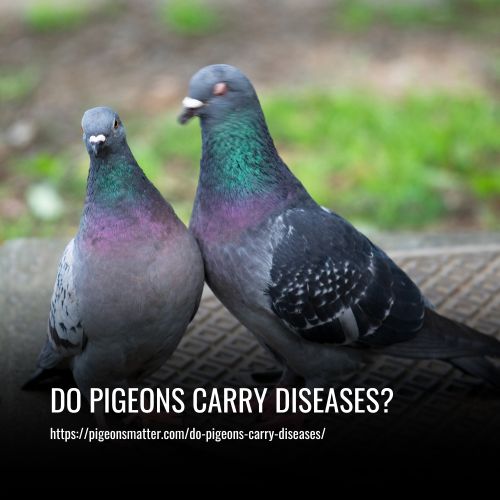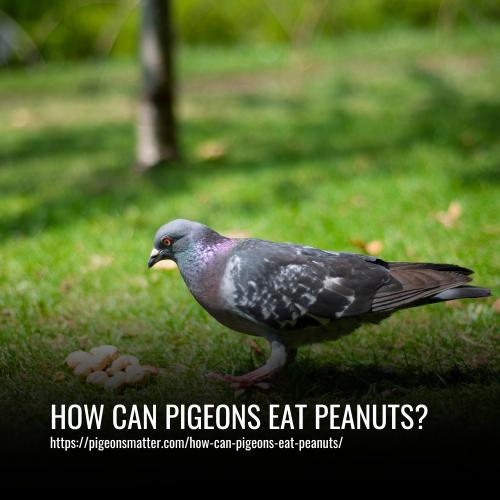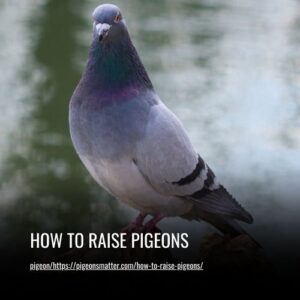Pigeons have long been a subject of debate among people. While some consider them to be a source of entertainment, others view them as carriers of diseases. The question arises: is it true that pigeons spread diseases or is it just a myth?
The answer is not as simple as we would like it to be. Unfortunately, it is true that pigeons carry a significant number of pathogens that can lead to the spread of harmful diseases. In fact, they are known to carry over 60 varieties of such pathogens. However, it is important to note that these diseases are rarely fatal to humans.

How Do Pigeons Spread Disease?
Pigeons have the potential to spread diseases through their droppings.
The droppings that are infected with bacteria or viruses are left to dry out on various surfaces like windowsills, cars, and streets. Once these droppings dry out, they turn into a powder that can be easily blown or kicked into the air and inhaled. The inhalation of the powder from the droppings is a method of pathogen transmission to humans, potentially resulting in various illnesses.
According to Medical News Today, some of the most common diseases that can be transmitted from pigeons to humans include E. coli, St. Louis encephalitis, Histoplasmosis, Candidiasis, and Salmonellosis. Pigeons are also carriers of mites, fleas, and the West Nile virus, which can cause discomfort and serious health issues in humans.
Which diseases do pigeons carry?
Research has indicated that pigeons have the ability to transmit different diseases, which can have varying degrees of severity, symptoms, and potential consequences.
In addition to being carriers of pathogens, they are also hosts to parasites that spread disease. In this article, we will discuss the most common diseases that pigeons carry and their potential impact on human health.
1. Toxoplasmosis:
Pigeons are known carriers of Toxoplasma gondii, a parasite that causes toxoplasmosis. This infection is present in humans all over the world, and can also be found in various animals and birds. The symptoms of toxoplasmosis may not be immediately apparent but typically appear 1 to 2 weeks after exposure to the parasite.
The disease can impact different parts of the body, such as the brain, lungs, heart, eyes, or liver. Treatment options for toxoplasmosis include antibiotics and an anti-malarial drug.
2. Alveolitis:
The lung condition known as Alveolitis or diffuse interstitial lung disease is caused by exposure to feathers, feather dust, and fecal material, particularly from pigeons, and results in inflammation of the deep lung tissues.
This condition is more likely to occur in individuals who are hypersensitive to these substances.
Symptoms may manifest within two years, but some people may not experience them until 10-20 years after continuous exposure.
3. Candidiasis:
Pigeons are carriers of the Candida albicans fungus which can cause a skin infection known as candidiasis. This infection can be transmitted to humans through contaminated water. The symptoms of candidiasis include blistered skin and irritation around the creases of the knees, elbows, and armpits.
The infected skin may also ooze and become inflamed. Candidiasis can spread to the mucus membranes in our body and poses a high risk to individuals with weakened immune systems. It is important to take necessary precautions to avoid exposure to pigeons and their droppings to prevent the spread of this infection.
4. Paratyphoid:
Pigeons can carry Salmonella bacteria, which can cause Paratyphoid in humans. This infection can affect different parts of the body such as joints, intestines, or genitals.
Bacteria can be transmitted through contact with infected pigeons, exposure to their droppings, or ingestion of contaminated food and water.
Symptoms of Paratyphoid include nausea, vomiting, and headache, which are similar to those of a stomach virus. If you experience these symptoms and suspect you may be infected, it’s important to seek medical attention.
5. Psittacosis:
Pigeons can carry a disease called psittacosis, which is caused by the bacterium C. psittaci. This disease is highly infectious and can spread rapidly. When transmitted to humans, it can develop into a disease known as psittacosis, which can cause a range of symptoms such as high temperature, tight chest, difficulty breathing, coughing, chills, fatigue, blurred vision, aches, muscular pains, and coughing up blood. The variation in disease severity is attributed to factors such as an individual’s immune system and overall health.
Mild flu-like symptoms may last for about 7-10 days in some cases. However, in severe cases, it may resemble pneumonia and cause respiratory complications, and potentially fatal outcomes. Psittacosis, if not treated, may result in inflammation of brain tissue and possibly permanent brain damage.
6. Histoplasmosis:
Pigeons can transmit diseases to humans, with histoplasmosis being one of the more frequently observed illnesses. This disease is caused by a fungus called Histoplasma and is highly infectious, although not as deadly as other diseases like psittacosis. Symptoms of histoplasmosis are similar to those of the flu, including a dry cough, fatigue, dull headaches, muscular aches, chills, and fever.
The majority of individuals who become ill with the disease can recuperate within a span of two weeks without the need for medical assistance or medication. Individuals with compromised immune systems or pre-existing health conditions may be at risk of experiencing additional complications and respiratory problems. It is important to take precautions around pigeons and their droppings to avoid contracting this disease.
7. Cryptococcosis:
Cryptococcosis is a disease caused by a fungus known as Cryptococcosis neoformans. It can manifest in different forms and attack various parts of the body. The pulmonary form of the virus affects the lungs and causes respiratory difficulties, fever, chills, dry cough, headaches, and fatigue.
If left untreated or not treated quickly enough, the disease can spread to other parts of the body, including the brain, kidneys, and skin, leading to more severe symptoms such as hydrocephalus, failing sight, papules across the body, ulcerous sores, nausea, confusion, double vision, cold sweats, swollen glands, skin rash, weight loss, internal bleeding, abdominal pain and swelling, and numbness in extremities.
In the most severe cases, it can develop into meningitis, which can be life-threatening and cause long-term, permanent brain or nerve damage.
9. E. coli.:
Pigeons are known carriers of E. coli, a type of bacteria that is commonly linked to food poisoning. While E. coli infections are typically not life-threatening, they can cause complications such as kidney failure in people who are more susceptible to illness.
Symptoms of E. coli include fatigue, shakiness, abdominal pain and cramps, diarrhea, and nausea. It is important to take precautions to avoid exposure to E. coli, especially in areas where pigeons are present.
10. Salmonellosis:
Pigeons can carry salmonella, a type of bacteria that is also associated with food poisoning. This infection is known as salmonellosis and has similar symptoms to E. coli, including stomach cramps, diarrhea, and fever.
While most people are able to recover from salmonellosis within a week, it can be dangerous for individuals with weakened immune systems. It’s important to take precautions when handling or being in close contact with pigeons to avoid contracting this disease.
11. Other diseases:
Aside from being carriers of diseases, pigeons can also serve as vectors for other illnesses, although they may not directly transmit them. Ticks can transmit Lyme disease after being exposed to infected pigeons.
While there is some debate among scientists about the possibility of pigeons transmitting avian flu to humans, recent studies have linked them to cases of the virus in various countries, including Russia.
Therefore, it is crucial to exercise caution around these birds. To minimize the risk of contracting diseases, it is advisable to avoid contact with pigeons.
How To Get Rid Of Pigeons
If you’re dealing with pigeon problems, it’s important to take action to protect your property and reduce the risk of disease. Pigeons can cause damage to buildings and interfere with electrical elements and air conditioners, not to mention the unsanitary conditions created by their droppings. To minimize the risk of disease, it’s crucial to clean up any pigeon droppings as soon as possible using disposable protective clothing, shoe coverings, an air-purifying respirator, and gloves.
Fortunately, there are various bird control solutions available to help reduce the number of pigeons on your property.
How To Protect Yourself Against Pigeon Diseases
Protecting yourself from pigeon diseases can be a challenge. The best way to avoid them is to stay away from pigeons and not feed them if you encounter them in public spaces.
However, if pigeons invade your home or office, it can become more complicated. Pigeons can fit into tight spaces and are known to seek shelter in attics, under porches, on roofs, and in rafters. Pigeons are not only dangerous themselves but their droppings pose a significant health risk. The presence of pigeon nests at high elevations near homes and entrances may result in droppings that could be a cause for concern.
If pigeons have already taken up residence in or near your home, the only solution is to have a professional pigeon exterminator remove them without causing any harm. Applying sealant and caulk to access points in advance can assist in preventing entry. But once they have taken over, it is too late. To protect yourself from pigeon diseases, it is crucial to keep your distance and take preventive measures to keep them away from your home or office.
How to spot an infected pigeon
It’s important to be able to identify when a pigeon is sick in order to protect yourself from potential diseases. Look out for the following symptoms: twisting of the neck (a key sign), paralysis, difficulty breathing or moving, convulsions, and disorientation or lack of coordination. If you observe any of these symptoms in a pigeon, it’s best to stay away from them as much as possible.
Contact E.Exterminateur to protect yourself from pigeon diseases
If you’re concerned about the health risks posed by pigeons, it’s important to take action to protect yourself. These birds can carry diseases that can be harmful to humans, making it crucial to address any infestations as soon as possible. In addition to damaging your property, pigeons can spread illness, so it’s essential to find a permanent solution to keep them away.
For effective pigeon removal, consider contacting E.Exterminateur. Our team of professional exterminators has the experience and expertise necessary to get rid of these pests and restore your home to a safe environment. We offer a free initial consultation to help you determine the best course of action. Protect yourself and your family from pigeon-borne diseases by contacting E.Exterminateur today.
FAQs
Yes, pigeons can carry various diseases, including histoplasmosis, cryptococcosis, salmonellosis, and ornithosis, which can be transmitted to humans through contact with their droppings, feathers, or respiratory secretions.
Diseases from pigeons can be transmitted to humans through direct contact with their droppings, feathers, or respiratory secretions. Inhalation of airborne particles contaminated with pigeon droppings can also pose a risk.
While not all pigeons carry diseases, they are known carriers of various pathogens. Pigeons living in urban environments, around crowded spaces, or in close proximity to humans may have a higher likelihood of carrying diseases due to the increased exposure to contaminants.
Symptoms of diseases carried by pigeons may vary, but common signs include respiratory issues, fever, fatigue, gastrointestinal problems, and in severe cases, pneumonia or meningitis. Consult a healthcare professional if you suspect exposure to pigeons has caused illness.
To minimize the risk of diseases from pigeons, avoid direct contact with them or their droppings. Maintain cleanliness in areas where pigeons frequent, use protective gear if handling their waste, and ensure proper ventilation in spaces with possible exposure to droppings.
While keeping pigeons as pets is possible, it’s essential to maintain proper hygiene, cleanliness, and regular veterinary care to reduce the risk of disease transmission. Ensure adequate living conditions and limit exposure to wild pigeons or their waste to minimize health risks.
Conclusion:
While pigeons may carry some diseases, the risk of contracting them is relatively low. It’s important to take proper precautions, such as avoiding direct contact with the birds and cleaning up droppings promptly, but there’s no need to panic.
Pigeons have been living alongside humans for centuries and pose little threat when proper hygiene and common sense are applied. So next time you see a flock of pigeons, don’t be afraid to enjoy their unique beauty and charm.


